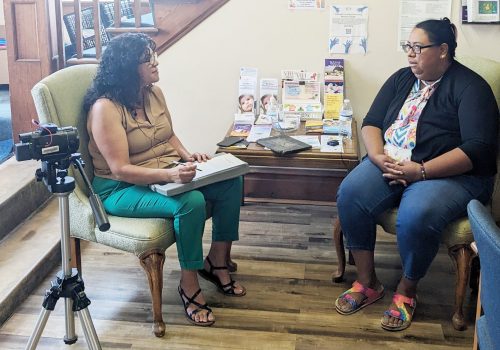Community Health Workers
- Website – Community Health Workers: A Unique and Vital Part of the Western North Carolina Social and Health Care Systems, Year 3 Initiative Evaluation
- Video – Envisioning Elemental Care: Multimedia Messages of Community Health Workers. An extended cut of the film is available here.
- Report – Evaluation of the Western North Carolina (WNC) Community Health Workers (CHWs) Initiative – Community Health Workers provide comprehensive care and comprehensively care
- Evaluation – Existimos para ellos/We exist for them: An Evaluation of the Community Health Workers (CHWs) as Culturally-Responsive COVID Support in WNC Communities Initiative
- Presentation – Evaluating community health worker initiatives with a community based participatory research and action model: 2021-2023
Social Isolation and Social Connectedness
- Publication – The Social Bridging Project: Intergenerational Phone-Based Connections With Older Adults During the COVID-19 Pandemic
- Website – Social Bridging NC
- Report – Social Bridging Project Feb 2023 Intergenerational Social Connectedness Report
Older Adult Wellbeing
- Report – 2023 Focus Groups to inform the North Carolina Division of Aging and Adult Services’ Development of a Multisector Plan for Aging
Peer-Led College Health Promotion
- Report – Student Health Ambassadors at Residential Campuses Contribute to Safer Campus Living and Learning During the COVID-19 Pandemic
Public Health Workforce Development
- Literature Review – In collaboration with the North Carolina Institute for Public Health (NCIPH) NCCHW reviewed 16 real-world examples of how Local Health Departments are improving how they serve their communities and to better understand what a culture of quality improvement looks like.
Results-Based Accountability
- Presentation – Introduction to Results-based Accountability
- Video – Results-Based Accountability Training
- Handout – RBA Framework: Common Language For Today
- Handout – Performance Measures Grid
- Presentation – Building the Bridge between Clinic and Community: Using Results-based Accountability to Help Improve Birth Outcomes. View the full sample RBA Elevator Speech here.
- Video – City of Asheville RBA 101
- Handout – WNC Healthy Impact Handout for “My RBA Speech”
- Poster Presentation – Finding Focus in the Joyful Complexity
- Presentation – The Joyful Complexity of Measuring Social Determinants of Health
Evidence-Based Programs
- Article – Senior Seminar Scholars: UNC Asheville Seniors Consistently Make a Mark on Campus and in the Community
- Article – Reach and Impact of In-Person and Remote Delivery Formats of Walk with Ease
- Publication – A Statewide Approach to Falls Prevention: Widespread Implementation of A Matter of Balance in North Carolina, 2014–2019
- Presentation – A Training Academy Model: Bringing CDSME to the Community and the State of North Carolina
- Website – Standing Strong NC Website
- Website – Healthy Aging NC Website
Brain Health
- Data Brief – BOLD NC 2023 Dementia Caregiver Data Brief
- Data Brief – 2020 Subjective Cognitive Decline Data Brief – North Carolina
- Title – The North Carolina Dementia and Brain Health Outreach and Awareness Toolkit
Understanding Attitudes Towards Violence
- Survey – Buncombe County Attitudes Towards Violence Survey
- Presentation – Designing trauma-Informed teams and data practices: Analysis of the Attitudes Towards Violence Survey (ATVS) Project in Buncombe County, North Carolina
- Presentation – Cross-agency collaboration to develop the “attitudes towards violence survey” and inform prevention and treatment efforts
- Fact Sheet – Buncombe County Sexual Assault Fact Sheet 2020
- Fact Sheet – Buncombe County DV Fact Sheet 2020
- Fact Sheet – Buncombe County Child Abuse Fact Sheet 2020
Storytelling
- Presentation – Data as Storytelling: Using Data to Improve Program Quality
Key Issues related to WNC Health Policies
- Website – WNC Health Policy Initiative Website
- Blog Post – Envisioning Elemental Care: Multimedia Messages of Community Health Workers
- Postcast – Child and Maternal Health in WNC – WNC Health Policy Podcast Ep. 1
- Postcast – School Meals for ALL NC – WNC Health Policy Podcast Ep. 2
- Podcast – Sexual Violence & Human Trafficking – WNC Health Policy Podcast Ep. 3
- Blog Post – In The News: NC Medicaid’s Healthy Opportunities Pilot
- Blog Post – New Resources for Healthy Aging and Social Determinants of Health
- Postcast – PSA: Radon in WNC
- Blog Post – Radon in WNC: Know Your Risks
Campus Health
- Publication – Student Health Ambassadors at Residential Campuses Contribute to Safer Campus Living and Learning During the COVID-19 Pandemic
- Presentation – Maximize Your Health and Wellness: Health Promotion On and Off Campus
- Report – COVID-19 and Health Disparities in WNC
Substance Use
- Report – McDowell Substance Use Task Force Strategic Plan
- Presentation – Leveraging Cross-institutional Academic Collaboration to Build Collective Impact within a Community-based Substance Misuse Coalition
- Report – McDowell Partnership for Substance Awareness Community Voices Research Final Report
- Report – Mcdowell Partnership for Substance Awareness, Inc Strategic Plan 2022-2026
Family and Child Health
- Assessment – Community assessment in partnership with the Verner Center for Early Learning
- Billboard – Initiative to Address Childhood Obesity in McDowell County, NC
- Report – Rainbow In My Tummy Expansion Feasibility Study: Increasing Access to Healthy Foods and Wellness in Early Care and Education Programs across Buncombe County
- Report – Arts For Life Program Evaluation Methods and Results
- Assessment – 2019 Verner Center for Early Learning Community Assessment
- Poster Presentation – Getting Urban Kids in Nature: An Evaluation of the Kids in Parks TRACK Trail
- Assessment – 2020-2021 Health and Wellness Community Assessment Update: Impact of COVID-19 and resilience factors for pregnant persons and families with young children in Buncombe County, North Carolina
- Blog Post – Racism is an Adverse Childhood Experience (ACE)
Resiliency
- Presentation – Communicating Resiliency
- Communicating Resiliency Video Series: Video (Part 1) | Video (Part 2)
- Presentation – Beyond Awareness: Raising Resilience in WNC
